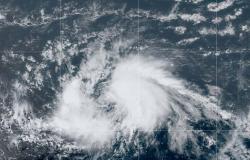This month in New York, UN members voted to grant Palestine more rights in the organization after its full membership campaign was blocked by the United States.
Photo: EFE – SARAH YENESEL
The member countries of the World Health Organization (WHO) decided to grant additional rights to Palestinian representatives, in line with a similar decision made this month by the UN General Assembly.
Of the 177 countries with the right to vote, 101 voted in favor and only five against this text that wants to “align Palestine’s participation” in the WHO with its participation in the UN.
The resolution presented by Arab and Muslim countries, China, Nicaragua and Venezuela stipulates that Palestinians, with observer status in the WHO, have practically the same rights as if they were full members.
From now on, the Palestinians will be able to sit among the Member States, submit proposals and amendments and be elected to the main committees of the Health Assembly.
On the other hand, as an observer State, “it does not have the right to vote in the Health Assembly or to present its candidacy to the WHO bodies.”
This month in New York, UN members voted to grant Palestine more rights in the organization after its full membership campaign was blocked by the United States.
The permanent representative of Palestine to the UN is Riyad Mansour, a Palestinian-American diplomat who has been in charge since 2005.
At the World Health Assembly in Geneva, the Palestinians and their allies gave up calling for full membership.
Several diplomatic sources explained that this responds to fears that a vote in favor of Palestinian accession would lead to an automatic suspension of US funding to the WHO.
“Children are dying of hunger”
According to the latest assessment by the World Health Organization (WHO) on the nutritional situation in Gaza, “children are simply suffering from hunger,” reported EFE. The main reason is that humanitarian aid is not reaching civilians in the Palestinian territory.
The evaluation found that of the eight food groups that constitute the basis of a healthy diet, 95% of children between six and 23 months consume “two groups or less” and, worse still, 85% had not eaten anything at all during at least one of the previous three days, revealed WHO spokesperson Margaret Harris in response to a question from EFE.
The United Nations Humanitarian Aid Coordination Office (OCHA) confirmed that “very little” aid is moving into Gaza and that the amounts are far “from what is desperately needed to stop a famine and avoid all the horrors that We’re seeing”.
“We insist again and again that Israel’s legal obligations (under international law) do not end at the border or a few meters from where aid is unloaded, and then left to humanitarians to transport it through zones of active combat,” responded OCHA spokesperson Jens Laerke.
“To be clear, help is not reaching the people and this is serious. We need more help and of course we want all parties to comply with their legal obligations… it is what they have to do,” he concluded.






